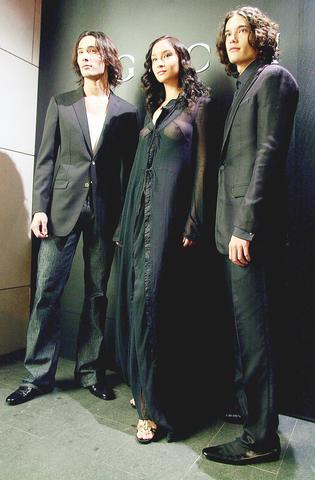Luxury goods company Gucci Group NV has acquired its agent in Taiwan, the company's president said in Taipei yesterday.
"We believe the Taiwan market has strong potential for further development and we are happy to now have full ownership and control of Gucci's operations in the country," said Domenico De Sole, president and CEO of Italy-based Gucci Group.
Prior to the acquisition, Gucci held roughly 20 percent of Gucci Taiwan Ltd. The remainder belonged to Tasa Meng Corp -- a Hong Kong-based venture in charge of Gucci sales in the Asia-Pacific region.

PHOTO: CHEN CHENG-CHANG
As part of the transition, Gucci yesterday opened the doors to its chic, new three-story flagship store in Taipei.
The 650m2 store is located on the corner of Chungshan N. Road and Changchun Road.
Gucci Taiwan operates eight outlets around the nation. Two are stand-alone stores and six are shops located inside department stores.
De Sole said yesterday the Gucci Group plans to invest a small fortune in global development this year.
"This year we are investing over 200 million euros (US$182.5 million) on the opening of 70 new stores around the world, including 35 stores in Asia," De Sole said.
De Sole said although the world economy is still coming out of its slump, investors are upbeat, as the company's performance on the New York Stock Exchange indicates.
"Market reaction is the best proof," he said. "Our stock jumped US$12 to US$98 after we announced the global investment plan" a few days ago.
Sales at Gucci Group were US$2.3 billion last year, up slightly from US$2.25 billion in 2000. Products branded with the Gucci name accounted for 60 percent of sales.
Gucci is the group's core brand. Other brands in the group include Yves Saint Laurent, Boucheron and Sergio Rossi.
But sales in Taiwan last year were slow, as the economic downturn forced consumers to rein in spending. Revenue last year "dropped slightly" from the year before, said Mimi Pun (潘鄧婉穎), president of Tasa Meng Corp.
Pun refused to disclose exact dollar figures. Still, she said Gucci sales were strong compared to other brand-name products.
A retail industry veteran said luxury goods may have been spared from the economic downturn.
"Middle-income consumers were the hardest hit and always tighten their belts in a slump, while high-income customers can afford luxury products any time," said Lee Kuang-rong (
Sogo has two outlets in Taipei. Its store on Chunghsiao E. Road provides a wide range of goods, while its store on Tun-Hwa S. Road features luxury goods.
"Sales growth at our Chunghsiao store was about 3 percent in 2001, while our Tun-Hwa outlet reported nearly 10 percent growth in the same period," Lee said.
Luxury goods are also becoming popular among credit-card carrying Taiwanese youth, who are often inclined to spend more than they earn. "They don't hesitate to shop with credit cards," Lee said.

SEEKING CLARITY: Washington should not adopt measures that create uncertainties for ‘existing semiconductor investments,’ TSMC said referring to its US$165 billion in the US Taiwan Semiconductor Manufacturing Co (TSMC, 台積電) told the US that any future tariffs on Taiwanese semiconductors could reduce demand for chips and derail its pledge to increase its investment in Arizona. “New import restrictions could jeopardize current US leadership in the competitive technology industry and create uncertainties for many committed semiconductor capital projects in the US, including TSMC Arizona’s significant investment plan in Phoenix,” the chipmaker wrote in a letter to the US Department of Commerce. TSMC issued the warning in response to a solicitation for comments by the department on a possible tariff on semiconductor imports by US President Donald Trump’s

‘FAILED EXPORT CONTROLS’: Jensen Huang said that Washington should maximize the speed of AI diffusion, because not doing so would give competitors an advantage Nvidia Corp cofounder and chief executive officer Jensen Huang (黃仁勳) yesterday criticized the US government’s restrictions on exports of artificial intelligence (AI) chips to China, saying that the policy was a failure and would only spur China to accelerate AI development. The export controls gave China the spirit, motivation and government support to accelerate AI development, Huang told reporters at the Computex trade show in Taipei. The competition in China is already intense, given its strong software capabilities, extensive technology ecosystems and work efficiency, he said. “All in all, the export controls were a failure. The facts would suggest it,” he said. “The US

The government has launched a three-pronged strategy to attract local and international talent, aiming to position Taiwan as a new global hub following Nvidia Corp’s announcement that it has chosen Taipei as the site of its Taiwan headquarters. Nvidia cofounder and CEO Jensen Huang (黃仁勳) on Monday last week announced during his keynote speech at the Computex trade show in Taipei that the Nvidia Constellation, the company’s planned Taiwan headquarters, would be located in the Beitou-Shilin Technology Park (北投士林科技園區) in Taipei. Huang’s decision to establish a base in Taiwan is “primarily due to Taiwan’s talent pool and its strength in the semiconductor

French President Emmanuel Macron has expressed gratitude to Hon Hai Precision Industry Co (鴻海精密) for its plan to invest approximately 250 million euros (US$278 million) in a joint venture in France focused on the semiconductor and space industries. On his official X account on Tuesday, Macron thanked Hon Hai, also known globally as Foxconn Technology Group (富士康科技集團), for its investment projects announced at Choose France, a flagship economic summit held on Monday to attract foreign investment. In the post, Macron included a GIF displaying the national flag of the Republic of China (Taiwan), as he did for other foreign investors, including China-based